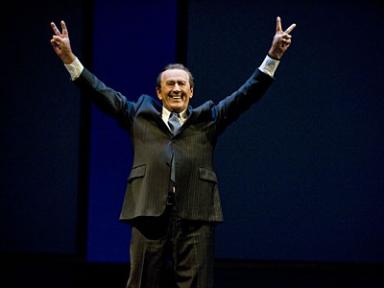Frost Nixon: i'm ready for my close up

Richard Nixon was famous for his intellect, bad language, viciousness, sweating and, oh, Watergate. Much to my surprise, in Peter Morgan’s Frost Nixon, we get a Nixon who doesn’t swear, doesn’t seem too vicious (except with the intensity of his avarice) and even the sweating – constantly referred to throughout – was missing as Len Cariou seemed quite dry and relaxed, mostly. As for the towering intellect, there wasn’t much of that either.
Still, Nixon should count himself lucky. His adversary – David Frost – comes off even worse. He’s played with bend at the knees, hand-clapping delight by David Storch and the audience ate it up. So did I. The only problem is that he seems to be in another play from everyone else, especially Cariou. There is no doubt that David Frost is a figure of fun in the UK but I felt this production and the script – which is based on the famous televised interview series from the 1970s – went too far in undermining him. Not just in respect to the real person (not that I care overly much) but within the created world of the piece. Frost knocked out one of the political/intellectual giants of their generation. There must have been more substance to him than is shown here – and if there truly was nothing there but a vain starvation for the limelight – then how he “accidently” knocked out Nixon needs to be better articulated then it is at the moment.
There is something off kilter about this play. Nixon is sort of Lear-like, Frost the court fool. Yet, Nixon is pushed to the background too much; which is maddening because Nixon is a hundred times more compelling and complex than Frost. But Frost is what we get. It’s almost as if Morgan couldn’t handle the intellectual and dangerous intensity of Nixon and preferred the safe froth of Frost. This surprising lack of intellectual heft is further reinforced by the central premise of the piece: that these were simply two media-whores fighting for the limelight. Dear God, is this all we can reduce Nixon’s life to, even if our frame is a television show: Norma Desmond for the 70s? Stardom is the motivation, darling. It all made sense later when I found out that this was Morgan’s first play and that he’s really a screenwriter. It also explains all those unnecessary characters populating the stage.
This co-production between the Vancouver Playhouse and Toronto’s CanStage, directed by Ted Dykstra looks cool and the performances are uniformly strong. Perhaps the wisest decision was to have Cariou avoid mimicking the distinctive voice and mannerisms of his subject. Instead he creates his own character, with his own posture and speech patterns. Weirdly this was undermined at one point when Michael Healy, playing one of Frost’s assistants, does an uncanny impression of the real Nixon. This delighted everyone in the audience including, again, myself; just that, you know, in the created world of the piece Nixon doesn’t really talk that way. Cariou invests the character with a sort of hesitancy of speech which mostly works although there were a couple of moments on opening night when those lengthening pauses had me worried that perhaps he’d lost his way.
Cariou’s performance – and the piece itself – builds to the moment of final confession. A man who once held raw power is shown vulnerable and haunted in an image that is frozen on a screen above the stage. While this is a moment that is handled well by director and performer, I found it a slight cheat. It wasn’t Cariou’s Nixon that I thought of but the real Nixon (and my vague, childhood recollections of him, he’s the first US president I can remember). Just like Healy’s impersonation pulled us outside the frame of the piece, so we need information from outside the frame to fully understand (and, I would argue, emotionally connect with) that frozen, haunted moment on the overhead screen.
There is more cheating that goes on in the script, including near constant direct to the audience address, delivered by the large supporting cast. This device, used to get across pertinent historical and background information (and, crucially at one point, to explain that we just saw an important moment in Nixon’s life, just in case we missed it), bugged me and I believe showed a lack of craft on Morgan’s part.
The story of Richard Nixon is both fascinating and complex and frankly deserves better than this. He might have been bested by a fop of an interviewer but it’ll take far more than a Norma Desmond-like hunger for fame to fully reach the Shakespearean depths of his soul.



